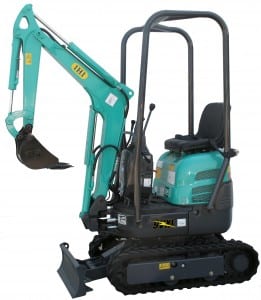Mini excavators are relatively easy to use and maneuver, making excavation equipment rental a viable option for small construction projects and larger ones that require working in confined spaces. But just because these small diggers feature simple controls and compact footprints does not mean that any mini will work for all applications or that operators can skip safety precautions. This handy guide will ensure you rent the correct excavation equipment and use it safely on your project.
What To Consider When Choosing a Mini Excavation Equipment Rental
Consider the scope of work to decide which excavation equipment rental will get the job done, including:
 Depth: Are you digging foot-deep post holes or 8-foot-deep holes? Select a mini excavator with digging depth sufficient for your needs.
Depth: Are you digging foot-deep post holes or 8-foot-deep holes? Select a mini excavator with digging depth sufficient for your needs.- Arm length: Will you be loading excavated dirt into a truck? Or are you lifting rocks into an elevated crusher? Make sure the arm will extend high enough without encountering overhead.
- Tracks and Weight: Rubber tracked mini excavators may be preferable to steel-tracked versions if there are concerns about disturbing landscaping. Heavy-duty steel tracks perform best when digging or removing debris from rugged areas. Balance the bigger machines’ (7- to 10-ton) ruggedness with the nimbleness and maneuverability of smaller models (3 to 4 tons).
- Offset Digging: Offset digging allows the operator to swing the boom away from its base to dig “beside” the tracks rather than in front of them. This feature comes in handy when you need to dig next to a structure or extend a trench.
- Tail Swing: Tail swing refers to how much the excavator’s cab extends over the tracks when the cab is rotated. With zero tail swing, if you can drive the excavator into a space, you can rotate the cab 360 degrees without hitting anything.
- Bucket Size: While the bucket size is generally governed by the weight of the machine, there is room for slight increases and decreases. Smaller buckets can make digging in small spaces easier. Larger buckets can speed up the job. However follow the excavator’s manufacturer guidelines to never exceed recommended lift weight.
- Attachments: Thumbs, augers, breakers, compactors, and other rented attachments make excavation equipment rental even more economical by expanding the machines’ capabilities. Many models also come with dozer blades installed, allowing for easy trench backfilling. Only use manufacturer-approved attachments that are properly installed.
What To Keep in Mind To Safely Operate Your Mini Excavation Equipment Rentals
Improper operation of mini excavators can prove deadly for users and bystanders as well. Follow these individual safety measures:
- Several days before work is scheduled to begin, dial 811 and ask the national Call Before You Dig service to mark the locations of underground utility lines. Do not dig until the lines are identified.
- Thoroughly inspect the site to discover ground-level or overhead conditions that might make using your rented excavation equipment difficult: steep slopes, rain-softened turf, ingress/egress confinements.
- Incautiously raising the bucket arm can damage or hinder the arm’s extension, but power lines create the most critical overhead concern. The excavator operator must be aware of the potential hazard before the job commences.
- Wear a hardhat sturdy, non-skid shoes, and ear and eye protection.
- Use the seatbelt and read all mini excavation equipment rental manufacturer instructions.
- Rent only machines with protective roll-over canopies.
- Consider an enclosed cab if operating in extreme heat or cold.
Mini excavators are smaller than their full-size cousins, but they are not toys. Never allow passengers – either in the cab or in the bucket! Keep onlookers a safe distance away.
Mini but Mighty: Compact Excavators Get the Job Done
The Pro Group carries a full line of mini excavators for rent. Request a Quote or call (857) 706-2980 to speak with our excavation equipment rental experts for more information on our rental terms and pickup and delivery options.
To work with excavators you must have a permanent Hoisting Engineers License or a Temporary Permit. Click here to learn how to get yours today.


 Depth: Are you digging foot-deep post holes or 8-foot-deep holes? Select a mini excavator with digging depth sufficient for your needs.
Depth: Are you digging foot-deep post holes or 8-foot-deep holes? Select a mini excavator with digging depth sufficient for your needs.
